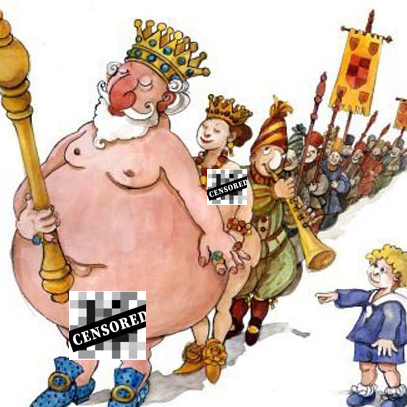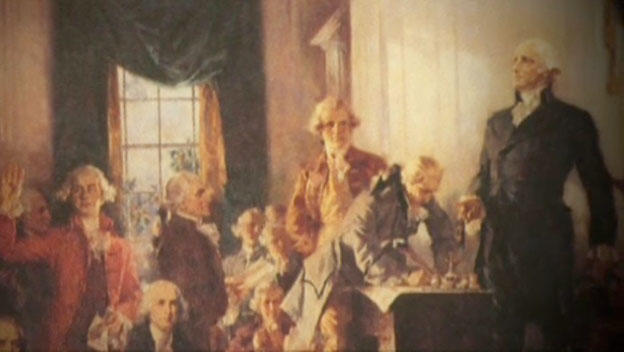Digital conditions, not competing intellectuals, will make it so.
Originalism has Failed

In its effects, it is synonymous with liberalism.
Conservatives are in danger of losing out on decades of hard work to educate and win over the population to an objective, fixed meaning of the Constitution. We are close to snatching defeat from the jaws of victory.
Adrian Vermeule’s recent essay in the Atlantic exposes the problem.
One of the delights of having young children is the experience of reading—multiple times—their favorite stories. Often read in my home is the Hans Christian Andersen classic “The Emperor’s New Clothes.” The humor is apparent—an old, self-important guy is walking around naked acting as if he is wearing the most fabulous outfit. Of course, the best part, for the kids, is the bold child who points out that the Emperor is naked. With that bold child, all the characters suddenly break free of peer pressure’s spell and can express what they all knew but feared to acknowledge: the Emperor’s new clothes were no clothes.
What we call conservative jurisprudence is going through a similar crisis today. Several of its leading figures, fans, and practitioners use words like “originalism,” “textualism,” and even the strenuous-sounding “strict constructionism” to describe their jurisprudence. But, sadly, what is starting to become apparent to all is that there is no jurisprudence behind these phrases.
After attacking originalism as defunct, Vermeule proceeds to advocate for a common-good jurisprudence. This resulted in strong responses from many quarters of the conservative movement. But most of these responses rely on the fiction that originalism is a healthy, robust jurisprudence that is working just fine. It is not.
Speaking Truth to Originalism
There are several areas of Supreme Court jurisprudence that reinforce an originalist and textualist approach to the Constitution. Some classic examples include the cases that involve the standards for granting equitable relief, found in opinions like eBay, Inc. v. MercExchange, LLC (2006), or in deciding what civil matters require a jury trial.
But there has been a definite creep among conservatives on the matter of speech.
Set aside whether applying the limitations on Congress to regulate speech against the states under the doctrine of selective judicial incorporation is originalist or textualist. Let’s look at whether the Court has taken the demands of originalism seriously when interpreting how the First Amendment is meant to restrain the relevant government entity’s regulation of speech.
There is little dispute that the main evil the Free Speech Clause seeks to eliminate is prior restraint. Indeed, going back to John Milton, a common complaint against the British government was its use of licensing. As the Supreme Court explained in Near v. Minnesota (1931): “In determining the extent of the constitutional protection, it has been generally, if not universally, considered that it is the chief purpose of the guaranty to prevent previous restraints upon publication.”
Nothing in that understanding would prevent punishment for speech contrary to the public good. As the Court stated in 1907: the free-speech provisions “do not prevent the subsequent punishment of such [speech] as may be deemed contrary to the public welfare.” Indeed, that punishment “may extend as well to the true as to the false.”
But consider what originalists say today: “Speech that demeans on the basis of race, ethnicity, gender, religion, age, disability, or any other similar ground is hateful; but the proudest boast of our free speech jurisprudence is that we protect the freedom to express ‘the thought that we hate.’” Another originalist-written opinion claims that: “As a Nation we have chosen a different course—to protect even hurtful speech on public issues to ensure that we do not stifle public debate.”
Whatever these lines mean, there is no doubt that we are far removed from a jurisprudence oriented toward preventing prior restraint and regulating speech to protect the public welfare.
Similarly, the religion cases over the past 50 years have little to do with the original meaning of the religion clauses or the purpose of those clauses in the constitutional structure. Those provisions are federalist provisions. As Justice Thomas explained in Elk Grove United School District v. Newdow (2004), “the Clause made clear that Congress could not interfere with state establishments, notwithstanding any argument that could be made based on Congress’ power under the Necessary and Proper Clause.”
Originalism=Liberalism
What Vermeule’s earnest conservative critics have failed to address is the elephant in the room: in the cases of greatest consequence, originalism means liberalism. Or to put it differently, originalism has failed to maintain the original meaning of key constitutional texts. That awkward fact affords Vermeule the luxury of putting out snark instead of substantive responses. His critics have not addressed the obvious weakness in practical originalism.
Ultimately, originalism cannot justify itself. Any endorsement of originalism as an interpretive tool must appeal to some antecedent principles about the nature or law and what makes a good legal system. Hence, the best defense of originalism cannot be made by legal minds squeamish about wrestling with moral reasoning. Nor can its proponents claim that it has been victorious on the intellectual battlefield—even its most high-profile champions have failed to follow its precepts in significant cases.
Vermeule has touched a nerve. The alleged advantage of originalism was providing a morally neutral and objective interpretive means that would produce predictable results based on a fixed meaning of constitutional text. It is obvious that it is not serving this purpose.
Rather than double down on originalism as it stands today, conservatives concerned about rule of law need to respond with the moral case for objective meaning in legal interpretation. The nature of what law is—rather than interpretative theories—can be the only refuge for those who would advocate the rule of law over the rule of men.
The American Mind presents a range of perspectives. Views are writers’ own and do not necessarily represent those of The Claremont Institute.
The American Mind is a publication of the Claremont Institute, a non-profit 501(c)(3) organization, dedicated to restoring the principles of the American Founding to their rightful, preeminent authority in our national life. Interested in supporting our work? Gifts to the Claremont Institute are tax-deductible.
Liberalism Is the Politics of Fear.
More than abstraction is at stake.
"Real Originalism has never been tried..."
A jurisprudence for all seasons—especially ours.
Only a dark theology can baptize the administrative state.






